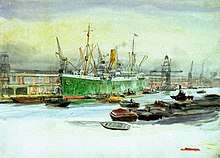MS Akaroa (1914)
MS Akaroa was a British passenger ship that sailed between the United Kingdom, Australia and New Zealand between 1914 and 1954.
.jpg) The Akaroa, in New Plymouth, New Zealand, in 1934 | |
| History | |
|---|---|
| Name: |
|
| Owner: |
|
| Builder: | Harland & Wolff, Belfast |
| Yard number: | 439 |
| Launched: | 29 January 1914 |
| Completed: | 6 June 1914 |
| Maiden voyage: | 1 July 1914 |
| Fate: | Scrapped, May 1954 |
| General characteristics [3] | |
| Type: | Passenger ship |
| Displacement: | 14,947 long tons (15,187 t) |
| Length: | 570 ft (170 m) |
| Beam: | 67 ft (20 m) |
| Propulsion: | Triple-expansion steam engines, 3 shafts |
| Speed: | 15 knots (28 km/h; 17 mph) |
| Capacity: | 1224 passengers (140 first class, 334 third class, 750 steerage) |

Ship history
The ship was built by Harland & Wolff of Belfast, Northern Ireland, and was originally named Euripides when she sailed for the Aberdeen and Commonwealth Line. She was launched on 29 January 1914 and was 14,947 gross tons at the time and could make a top speed of 15 knots. Her shakedown cruise took place in June 1914, with her maiden voyage from London to Brisbane leaving on 1 July 1914. Two days after her arrival, she was taken over for Australian troop transport; the following year she returned to the UK-Australia run, but would continue transporting Australian troops through 1919, when she was overhauled at Belfast.[4]
In 1929, the Euripides was transferred to the White Star Line, and in 1932 was again transferred, this time to the Shaw, Savill & Albion Line. The company had her re-fitted to 15,128 gross tons, and renamed the ship Akaroa, sailing her from Southampton, England to Wellington, New Zealand by way of the Panama Canal. The round journey could be taken for £112.[5]
On 1 September 1939, two days before the declaration of war, under Captain William Horatio Hartman, she set sail for Auckland, arriving on 8 October. The voyage was an epic one and the passengers presented the Captain with a silver salver in memory of, "an epic and perilous voyage". Captain Hartmann was awarded the OBE in 1943.[6] In 1945 she was again re-fitted, and continued the UK-NZ run. Finally, in May 1954, she was sent to the breakers at Antwerp.[4] Her scrap value was £130,000.[5]
References
- "Aberdeen Line / Aberdeen & Commonwealth Line". theshipslist.com. 2012. Retrieved 23 August 2012.
- "Shaw, Savill & Albion Line". theshipslist.com. 2012. Retrieved 23 August 2012.
- Wiringa, Robert B. (2012). "Euripides". bob.plord.net. Retrieved 23 August 2012.
- Haws, Duncan (1989). Aberdeen & Commonwealth Lines. Merchant Fleets. 17. Retrieved 23 August 2012.
- Dunn, Laurence (1964). Famous liners of the past - Belfast Built. London: Adlard Coles Ltd.
- "No. 36035". The London Gazette (Supplement). 28 May 1943. pp. 2491–2492.